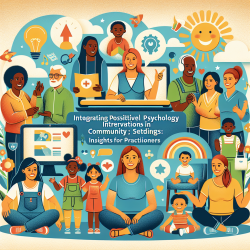Introduction
In the realm of positive psychology, the focus has traditionally been on enhancing individual well-being. However, recent research, including the study "Fostering Positive Communities: A Scoping Review of Community-Level Positive Psychology Interventions," highlights the potential of extending these interventions to community settings. This shift in focus is crucial for practitioners aiming to create broader societal impacts, especially in educational environments where online therapy services like those offered by TinyEYE can play a pivotal role.
Understanding Community-Level Interventions
The scoping review by Montiel et al. (2021) examines 25 community-level positive psychology interventions across 31 studies. The findings reveal a diverse range of target populations, intervention modalities, and objectives. However, a common theme is the emphasis on individual-level changes to achieve group outcomes. This approach often overlooks contextual factors such as social conditions and fairness, which are essential for holistic community well-being.
Key Insights for Practitioners
- Targeting Well-being Holistically: The interventions reviewed primarily aimed at enhancing psychological and overall well-being, with character strengths like hope and gratitude frequently targeted. Practitioners should consider these elements when designing programs, ensuring they address both individual and community needs.
- Incorporating Participatory Methods: Few interventions involved participatory approaches, which are vital for empowering communities and fostering civic virtues. Practitioners should strive to involve community members actively in the design and implementation of interventions.
- Addressing Structural Factors: The review highlights a gap in addressing structural barriers to well-being, such as discrimination and resource inequality. Practitioners should integrate strategies that consider these factors, promoting social justice alongside individual well-being.
Implementing Positive Psychology in Schools
For practitioners working in school settings, the insights from this review are particularly relevant. Online therapy services can be tailored to incorporate positive psychology principles, focusing on enhancing student well-being and resilience. By fostering a supportive school environment, practitioners can contribute to the development of thriving communities.
Encouraging Further Research
While the current body of research provides valuable insights, there is a need for further studies to explore the integration of positive psychology and community psychology. Practitioners are encouraged to engage in research that examines the impact of community-level interventions, particularly in diverse cultural and socio-economic contexts.
Conclusion
The scoping review underscores the potential of positive psychology interventions in community settings. By addressing both individual and structural factors, practitioners can enhance well-being on a broader scale. As the field evolves, integrating these insights into practice will be crucial for creating positive outcomes for children and communities.
To read the original research paper, please follow this link: Fostering Positive Communities: A Scoping Review of Community-Level Positive Psychology Interventions.










